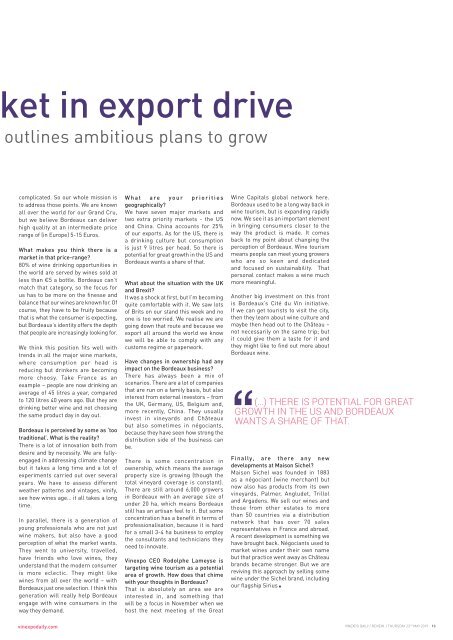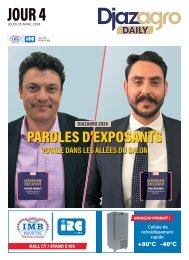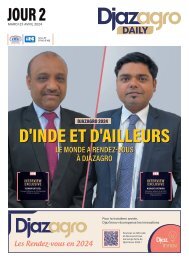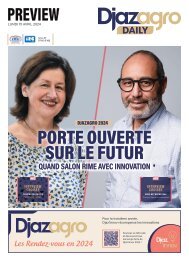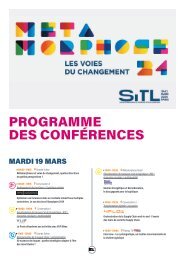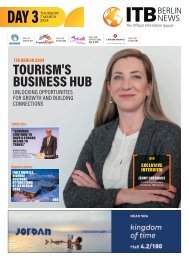Vinexpo Daily 2019 - Review Edition
Create successful ePaper yourself
Turn your PDF publications into a flip-book with our unique Google optimized e-Paper software.
et in export drive<br />
outlines ambitious plans to grow<br />
complicated. So our whole mission is<br />
to address those points. We are known<br />
all over the world for our Grand Cru,<br />
but we believe Bordeaux can deliver<br />
high quality at an intermediate price<br />
range of (in Europe) 5-15 Euros.<br />
What makes you think there is a<br />
market in that price-range?<br />
80% of wine drinking opportunities in<br />
the world are served by wines sold at<br />
less than €5 a bottle. Bordeaux can’t<br />
match that category, so the focus for<br />
us has to be more on the finesse and<br />
balance that our wines are known for. Of<br />
course, they have to be fruity because<br />
that is what the consumer is expecting,<br />
but Bordeaux’s identity offers the depth<br />
that people are increasingly looking for.<br />
We think this position fits well with<br />
trends in all the major wine markets,<br />
where consumption per head is<br />
reducing but drinkers are becoming<br />
more choosy. Take France as an<br />
example – people are now drinking an<br />
average of 45 litres a year, compared<br />
to 120 litres 40 years ago. But they are<br />
drinking better wine and not choosing<br />
the same product day in day out.<br />
Bordeaux is perceived by some as ‘too<br />
traditional’. What is the reality?<br />
There is a lot of innovation both from<br />
desire and by necessity. We are fullyengaged<br />
in addressing climate change<br />
but it takes a long time and a lot of<br />
experiments carried out over several<br />
years. We have to assess different<br />
weather patterns and vintages, vinify,<br />
see how wines age… it all takes a long<br />
time.<br />
In parallel, there is a generation of<br />
young professionals who are not just<br />
wine makers, but also have a good<br />
perception of what the market wants.<br />
They went to university, travelled,<br />
have friends who love wines, they<br />
understand that the modern consumer<br />
is more eclectic. They might like<br />
wines from all over the world – with<br />
Bordeaux just one selection. I think this<br />
generation will really help Bordeaux<br />
engage with wine consumers in the<br />
way they demand.<br />
What are your priorities<br />
geographically?<br />
We have seven major markets and<br />
two extra priority markets - the US<br />
and China. China accounts for 25%<br />
of our exports. As for the US, there is<br />
a drinking culture but consumption<br />
is just 9 litres per head. So there is<br />
potential for great growth in the US and<br />
Bordeaux wants a share of that.<br />
What about the situation with the UK<br />
and Brexit?<br />
It was a shock at first, but I’m becoming<br />
quite comfortable with it. We saw lots<br />
of Brits on our stand this week and no<br />
one is too worried. We realise we are<br />
going down that route and because we<br />
export all around the world we know<br />
we will be able to comply with any<br />
customs regime or paperwork.<br />
Have changes in ownership had any<br />
impact on the Bordeaux business?<br />
There has always been a mix of<br />
scenarios. There are a lot of companies<br />
that are run on a family basis, but also<br />
interest from external investors – from<br />
the UK, Germany, US, Belgium and,<br />
more recently, China. They usually<br />
invest in vineyards and Châteaux<br />
but also sometimes in négociants,<br />
because they have seen how strong the<br />
distribution side of the business can<br />
be.<br />
There is some concentration in<br />
ownership, which means the average<br />
property size is growing (though the<br />
total vineyard coverage is constant).<br />
There are still around 6,000 growers<br />
in Bordeaux with an average size of<br />
under 20 ha, which means Bordeaux<br />
still has an artisan feel to it. But some<br />
concentration has a benefit in terms of<br />
professionalisation, because it is hard<br />
for a small 3-4 ha business to employ<br />
the consultants and technicians they<br />
need to innovate.<br />
<strong>Vinexpo</strong> CEO Rodolphe Lameyse is<br />
targeting wine tourism as a potential<br />
area of growth. How does that chime<br />
with your thoughts in Bordeaux?<br />
That is absolutely an area we are<br />
interested in, and something that<br />
will be a focus in November when we<br />
host the next meeting of the Great<br />
Wine Capitals global network here.<br />
Bordeaux used to be a long way back in<br />
wine tourism, but is expanding rapidly<br />
now. We see it as an important element<br />
in bringing consumers closer to the<br />
way the product is made. It comes<br />
back to my point about changing the<br />
perception of Bordeaux. Wine tourism<br />
means people can meet young growers<br />
who are so keen and dedicated<br />
and focused on sustainability. That<br />
personal contact makes a wine much<br />
more meaningful.<br />
Another big investment on this front<br />
is Bordeaux’s Cité du Vin initiative.<br />
If we can get tourists to visit the city,<br />
then they learn about wine culture and<br />
maybe then head out to the Château –<br />
not necessarily on the same trip; but<br />
it could give them a taste for it and<br />
they might like to find out more about<br />
Bordeaux wine.<br />
(…) THERE IS POTENTIAL FOR GREAT<br />
GROWTH IN THE US AND BORDEAUX<br />
WANTS A SHARE OF THAT.<br />
Finally, are there any new<br />
developments at Maison Sichel?<br />
Maison Sichel was founded in 1883<br />
as a négociant (wine merchant) but<br />
now also has products from its own<br />
vineyards, Palmer, Angludet, Trillol<br />
and Argadens. We sell our wines and<br />
those from other estates to more<br />
than 50 countries via a distribution<br />
network that has over 70 sales<br />
representatives in France and abroad.<br />
A recent development is something we<br />
have brought back. Négociants used to<br />
market wines under their own name<br />
but that practice went away as Château<br />
brands became stronger. But we are<br />
reviving this approach by selling some<br />
wine under the Sichel brand, including<br />
our flagship Sirius<br />
vinexpodaily.com<br />
VINEXPO DAILY / REVIEW / THURSDAY 23 TH MAY <strong>2019</strong> 13


